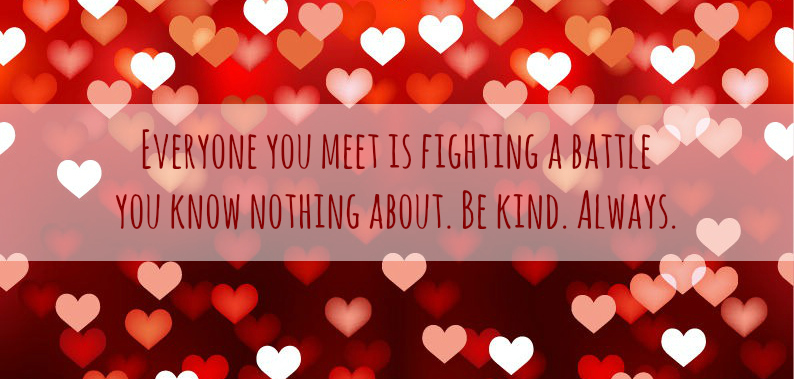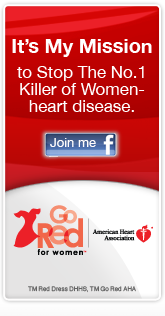 September 9-15 is “National Invisible Chronic Illness Week,” and this meme — 30 Things About My Invisible Illness — is making the rounds of many online communities. Here’s my contribution to making heart disease more visible.
September 9-15 is “National Invisible Chronic Illness Week,” and this meme — 30 Things About My Invisible Illness — is making the rounds of many online communities. Here’s my contribution to making heart disease more visible.
1. The illness I live with is heart disease (heart attack, coronary artery disease, endothelial dysfunction, microvascular disease).
2. I was diagnosed with it in the year 2011.
3. But I had symptoms a few weeks before my first heart attack in August 2011. I think. It’s hard to say. When symptoms are things like “fatigue” and “nausea” it’s very hard to pinpoint!
4. The biggest adjustment I’ve had to make is mental and emotional, coming to terms with mortality, living with a chronic illness, and all I’ve had to give up because of it.
5. Most people assume that heart attacks are an “event,” like a car accident and you either survive or die, but that remain in the past. In fact, a heart attack is just one (albeit dramatic) symptom of a chronic disease. You may survive a heart attack, but you will never escape the disease.
6. The hardest part about mornings is joint pain caused by statins. It wears off, though.
7. My favorite medical TV show is ER.
8. A gadget I couldn’t live without is my iPhone.
9. The hardest part about nights is thinking about leaving my children. There isn’t a day that I don’t think of that.
10. Each day I take 7 pills & vitamins. (Down from a high of 14, so that’s progress!)
11. Regarding alternative treatments, I have researched dozens and while I can certainly see the benefits of approaches like veganism, ultra-low-fat diets, stress-management, exercise, or heart-supportive supplements and I do many of them, I regard anything claiming to “cure” or “reverse” heart disease as reckless and irresponsible. Improve my quality of life? Absolutely. Make me live longer, happier, and healthier? Sure — I’d eat nothing but banana leaves and hang in traction two hours a day if it meant I didn’t have pain. But cure or reverse heart disease? No. I won’t ever let my guard down like that.
12. If I had to choose between an invisible illness or visible I would choose invisible. Because while it is lonely sometimes, people don’t treat me differently.
13. Regarding working and career, I feel grateful that I was not working during my heart attacks and recovery. I had time — lots of it — to learn and write and try new things. I’m going back to work in a few days, and I’m confident and excited about the new challenges ahead. My priorities, however, are different now. My health comes first, my family second, and my career after that. If you don’t have your health, nothing else is possible.
14. People would be surprised to know that heart disease is the number one killer of women in America. That 42 percent of women who’ve had a heart attack don’t survive the first year. That women’s heart attack symptoms are vastly different from men’s (aka the Hollywood heart attack) and misdiagnosed at an alarming rate. That women’s chronic heart disease is vastly different as well. People would probably be unsurprised, however, to learn that nearly all studies, medications, and interventions are developed for and tested on men.
15. The hardest thing to accept about my new reality has been the limits placed on my life, most painful of all is no more children.
16. Something I never thought I could do with my illness that I did was . . . hmm, this one is hard, because I assumed I could just go back to doing everything I wanted to, and so I did. I went back to distance running. I already live with my heart on my sleeve, so speaking and writing about it publicly seemed natural. What I never thought I could do, though, is accept limits, and I’m not sure how well I’m doing on that. (Oh, and I certainly never expected to be in a fashion show, so there’s that!)
17. The commercials about my illness make it seem like it is all about cholesterol. It’s not. If it were, it wouldn’t be the #1 killer of women and men in this country. Statins work for their intended purpose — to drop cholesterol to the basement. That doesn’t mean the rate of heart disease or death has decreased. (My LDL at the time of my second heart attack was somewhere around 80.) Also, the commercials only feature men — men at least 55. This could not be further from reality.
18. Something I really miss doing since I was diagnosed is running marathons.
19. It was really hard to have to give up the idea of having a family of at least three children. When that’s the toughest real truth, giving up butter or cream or Diet Coke is pretty insignificant.
20. A new hobby I have taken up since my diagnosis is blogging. I started this blog because of my heart attack. It has been a true gift to me, in so many ways.
21. If I could have one day of feeling normal again I would run the Twin Cities Marathon again.
22. My illness has taught me humility, perspective, and my own strength.
23. Want to know a secret? One thing people say that gets under my skin is: See above #11. “Cure” or “reverse.” I do not have the same reaction about the word prevent, however, because 80 percent of cardiac events (and I’m not in that cohort) could have been prevented through the no-brainer lifestyle choices you already know: don’t smoke, eat right, exercise, know your numbers.
24. But I love it when people read this blog, send me photos on Wear Red Day, ask me questions about heart health for themselves, their friends, their children, their sisters, their mothers.
25. My favorite motto, scripture, quote that gets me through tough times is: “Everyone you meet is fighting a battle you know nothing about. Be kind. Always.”
26. When someone is diagnosed I’d like to tell them to be as mindful of their emotional and mental health as their physical health, but to give themselves a break. It takes a lot of time become the new you. Get help. You don’t need to bootstrap it. Keep talking and asking for help until you get it.
27. Something that has surprised me about living with an illness is the incredible loneliness. There is only one person in the world who really knows what it is like and that’s myself. No matter how much your family and friends love you and want to help, there’s only so far they can go. My heart people — fellow patients, advocates, friends, doctors, trainers, and nurses — can only do so much. In the end, you have to become your own best friend, your best support system, and your best source of strength and hope. It’s an amazing thing . . .when you can do it.
28. The nicest thing someone did for me when I wasn’t feeling well was . . . this list is endless! Made me laugh, talked to me about normal things, brought me dinner, wine, dark chocolate, waited around for me to be a better friend, mom, wife, sister, never gave up on me.
29. I’m involved with Invisible Illness Week because #25. I learned this one long before my own illness, when my son was born premature and we spent eight weeks in the NICU. I remember seeing people on the sidewalk, in stores, eating out, just walking and talking and seeming perfectly normal and wondering how on Earth they could be doing that — didn’t they know the world was ending? Now I know we all carry our own lonely battles with us, always.
30. The fact that you read this list makes me feel less alone.
Love,
Jen
P.S. Two of my heart-sister bloggers have also shared their 30 things. You might like to read Jodi and Carolyn‘s lists too.



Thanks Jen for linking to my own “30 things” list, but mostly for sharing this profound exercise with us! I found it very therapeutic when I did mine, and was surprised that even my closest friends and family mentioned that they “didn’t know” some of the things I shared. I love your motto SO MUCH: “Everyone you meet is fighting a battle you know nothing about. Be kind. Always.”
Thank you Carolyn!
Thanks, Jen, for sharing this. When I see the motto in #25, I most often think of the people with mental health problems. Thanks for sharing your experience.
I love your list Jen! I love to read other perspectives than mine because although we suffered the same diagnosis is really affects lives so differently depending on what your life was pre-diagnosis! Thank you for linking me:)